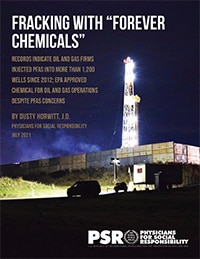Physicians Group Uncovers Evidence that “Forever Chemicals” (PFAS) Have Been Used Extensively in Fracking Unbeknownst to Public
A new report, released July 12, 2021 by Physicians for Social Responsibility (PSR), presents evidence that oil and gas companies including ExxonMobil and Chevron have used per- and polyfluoroalkyl substances (PFAS), and/or substances that can degrade into PFAS, in hydraulic fracturing (“fracking”) for oil and gas in more than 1,200 wells in six U.S. states between 2012 and 2020. The following states were identified: Arkansas, Louisiana, Oklahoma, New Mexico, Texas, and Wyoming.
The report also notes that, due to the lack of full disclosure concerning chemicals used, PFAS could have been used in additional states and in drilling and other extraction techniques that precede the underground injections known as fracking.
PFAS have been linked to cancer, birth defects, pre-eclampsia, and other serious health effects. Toxic in minuscule concentrations, they accumulate inside the human body and do not break down in the environment – hence their nickname, “forever chemicals.”
Evidence related to the use of PFAS or PFAS precursors in oil and gas operations has not been previously publicized.
The report, Fracking with “Forever Chemicals,” also documents the U.S. Environmental Protection Agency (EPA)’s approval of three chemicals for use in oil and gas drilling and/or fracking, despite EPA’s written observation that the chemicals could degrade into substances similar to PFOA, the most infamous PFAS, highlighted in the 2019 feature film Dark Waters. EPA regulators wrote:
“EPA has concerns that these degradation products will persist in the environment, could bioaccumulate or biomagnify, and could be toxic (PBT) to people, wild mammals, and birds based on data on analog chemicals, including PFOA and [REDACTED].”
One of these chemicals was used commercially for unspecified purposes as recently as 2018, according to EPA records.
The full report published by Physicians for Social Responsibility can be found here.

